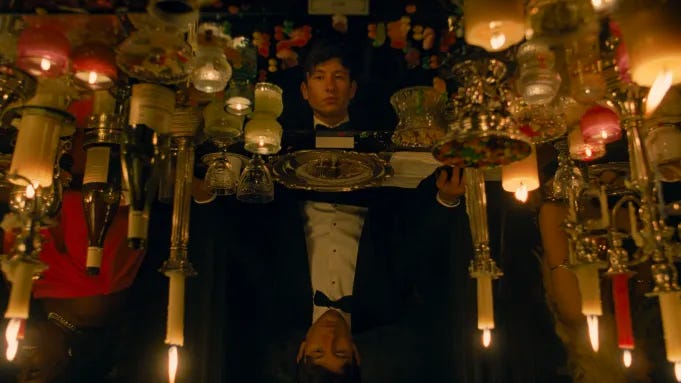The Yearning Rating: ✰✰✰½
Romance: ✰
Sex: ✰✰✰
Storytelling: ✰✰✰✰
Performance: ✰✰✰✰½
Yearning: ✰✰✰✰ ½
Bonjour, Yearners! Throw us a bone, why don’t ya? (Like this post to boost engagement) <3
I’m keeping this review **mostly** spoiler-free ahead of the film’s wide release!
Written by Ali Romig
Before I get too deep into my review of Saltburn, I must disclose some very important information about my viewing experience. I was seated in the front row, and I mean FRONT ROW—row one, seat 9 (for inquiring minds). I was so close to the screen, that in order to take in the entirety of any one scene, my eyes had to roam at a constant, near-rapid speed. If you’re a regular movie theater patron, you know that this is not arbitrary information. It affects how you watch a film. This may be even more relevant when it comes to Saltburn, a psychological thriller that utilizes tight shots of its characters invading each other’s personal space in order to assert their dominance. Maybe sitting in the front row actually offered an enhancement? It certainly brought home the overwhelming claustrophobia in those interactions against an otherwise vast and spacious landscape. Or maybe I am just trying to make myself feel better after leaving the theater with a pounding headache. You be the judge!
Saltburn is the latest from writer-director (and actress) Emerald Fennell. You may know her as the Academy-Award winning creator of 2020’s Promising Young Woman, but I know her as the bowl-cut-wig-wearing Camilla on The Crown. She’s been rightfully acclaimed for both. With Promising Young Woman, Fennell showed off her raucous, biting, and unafraid narrative voice, and in Saltburn, these same elements remain sharp even if the content is more rollicking than relevant.
The film is a bit of a modern, yet nostalgic—it’s set in the early-aughts—Brideshead Revisited (or a very British Great Gatsby) in that it follows an unreliable narrator as he looks back on a period in his life that seemingly changed everything. Oliver Quick (a chilling, magnetic Barry Keoghan—I mean seriously, this man carries the film) is a new student at Oxford in the fall of 2006. We immediately see that he is shy, and somewhat of a loner—a scholarship student who is disconnected from the nepotistic world of the elite school. He becomes fascinated with the enigmatic, wildly privileged Felix (a perfectly typecast Jacob Elordi).
After a seemingly random show of kindness, Felix takes the timid Oliver under his wing, and the two fall into an obsessive, borderline romantic friendship. After Oliver tells Felix that tragedy has struck his family and he can’t bring himself to return home, Felix invites Oliver to his family’s…estate? Manor? Castle? Whatever the proper term is, he invites Oliver to the massive family home, Saltburn, for the summer holiday, where he meets Felix’s frazzled father (Richard E. Grant) and his psychotically detached mother (Rosamund Pike). It’s at this point that the movie shifts gears from a coming-of-age friendship drama to an absolutely unpredictable psycho-thriller. As Felix’s sister Venetia (Alison Oliver) says to the newly arrived Oliver, “We’re all about to lose our fucking minds.”
In terms of form, the movie is impressive. Stylistically, I loved the mashup of the imposing and timeless historic settings with the kind of disgusting tackiness of 2007’s attire and aesthetic. There’s so much argyle, bad polos paired with chokers, and gaudy animal print—it’s amazing! I’m obsessed with the fact that being set in the early-aughts now distinguishes something as a period piece. (What looks will we be regretting ten years from now? I can’t wait to find out!) There’s a wonderfully dissonant moment in which Felix takes Oliver for a tour of the estate—pointing out features such as a bed that once belonged to the King—and then finishes in what is basically a normal TV room, decorated with lots of red upholstery, where his family is watching Superbad on a chunky flat screen.
While occasionally clunky, Saltburn’s structure is still intriguing because it begins with a series of quick flashes of scenes from throughout the movie, ostensibly showing us exactly what is about to happen. In this way, the film plays with memory—or more accurately, the act of forgetting. These teasers don’t spoil anything, because we can’t possibly accept or process information that is so wildly disconnected from any sort of grounding context. This same idea affects each of the characters, as they try to piece together a truth while being actively manipulated. It’s incredibly interesting as a viewer to confront the way an image's meaning can change once you’ve had time to develop your own biases and ideas about what’s real.
This all brings us back to our unreliable narrator, Oliver. In a Q&A that took place after my screening, Fennell revealed that the idea for Saltburn sprung from the image of an older Oliver speaking directly to camera, telling the audience that he “wasn’t in love with him”—meaning Felix—while obviously lying to both us and himself. However, in the final version of the film, the first image isn’t of Oliver claiming that he never loved Felix—rather, he poses a question to the audience: “Was I in love with him?” It’s a question he returns to throughout the film, but never actually answers. This small shift makes a huge difference. Rather than make the lie explicit, Fennell simply implies it. And by never actually answering the question, she leaves it up to the audience to decide which is the lie—that Oliver loved Felix, or that he never loved him. After watching the film, you’ll understand that both statements have teeth.
All this talk of love may lead you to believe that this film is a romantic one—but don’t be fooled. In Saltburn, sex is all about the shifting and taking of power, and real love isn’t discussed except as a quaint concept. In this regard, the queerness in the movie is a natural extension of these power plays. In some ways, I grow tired of queerness being used as a shorthand for how far a character might be willing to go for control, ie. “I am willing to do anything, sleep with anyone, to realize my ultimate goals.” However, I am reluctant to come down too hard here. Stories of the rich and famous, thrillers especially, have always utilized sex in this way—as a stepping stone, a vehicle, a bargaining chip. It’s a touchstone of the genre. I think viewing Saltburn in these terms, rather than as a strictly queer film, helps bring Fennell’s choices into clearer focus.
In those delightful moments when it gets it right, Saltburn is horny, witty, viciously dark comedy at its sharpest. While I wouldn’t say the ending is wholly unexpected, I do think that the ride to get there is wild and psychologically twisted enough to keep anyone interested. I’ll leave you on this hopefully intriguing note—if you’re someone who went absolutely ballistic for the peach scene in Call Me By Your Name…well, let’s just say this film has a lot for you to chew on.











I read a review on Letterboxd which basically said that that the homoerotism present in the first two acts was completely turned on its head in the third one, but yours luckily made it more captivating (I was already very intrigued and I was side-eyeing criticism, but that review had lowered my interest a tad).